The Antichrist wears a red tie
Trump cloaks himself in the language of defending the West, but his actions suggest something more destructive
There’s a mythology within the MAGA movement that Trump is a historic defender of the West. That he alone has the courage to stand up for Western civilization while everyone else caves to globalism, wokeness, and decay. Trump may be flawed, the thinking goes, but he’s the one willing to make the hard choices required for sovereignty and renewal.
Trump himself leans into this myth. At CPAC last month, he declared that “only strong borders, strong values, and strong leaders can save Western civilization from collapse.” His campaign cast his reelection as a last stand for Western heritage and Judeo-Christian values — a battle for the soul of Western civilization itself.
His closest allies echo this message. Tucker Carlson has called Trump a “civilizational firewall” against “woke globalism.” J.D. Vance once declared that “Trump is the only person who can save the West.” Elon Musk has made similar remarks.
Back in 2016, I bought into this line of thinking. But today, as I observe this administration’s handling of Ukraine and other Western allies, the whole narrative rings hollow. Trump looks less like the West’s savior and more like its saboteur.
Lately, I’ve found myself asking a deeper, more uncomfortable set of questions: What if the MAGA myth isn’t just wrong but entirely backwards? What if Trump isn’t the redeemer of Western civilization… but its Antichrist?
I know that sounds dramatic, even biblical. But the archetype is worth considering, especially in an age when global geopolitics feel increasingly apocalyptic. Today, language about eschatology and existential threats is no longer confined to religion, but echoed by technologists, political thinkers, and philosophers.
The Antichrist, in Christian tradition, isn’t an obvious villain. He poses as a savior while working toward destruction. He offers the illusion of strength while hollowing out what truly matters. He is a false prophet — more serpent than shepherd, more spectacle than substance. A wolf in sheep’s clothing.
When Trump first ran for office in 2016, he wrapped himself in the imagery of strength, sovereignty, and identity. He spoke the language of civilizational revival, protecting borders, restoring values, and preserving the West. But looking back, I wonder if this may have been like a whitewashed tomb — dazzling from the outside, empty on the inside.
The defining speech of this mythology was on July 6, 2017, in Warsaw. Trump stood before the Warsaw Uprising Monument, invoking the courage of those who resisted both Soviet and Nazi tyranny, asking whether the West still had “the will to survive.”
He posed a series of rhetorical questions, asking whether the West still had the confidence and courage to defend its values and protect its borders.
I watched the speech from Riga, Latvia, where I was speaking at NATO's annual strategic communications conference. Watching it from there made the speech feel weighter. Trump was controversial among NATO crowd, but he was speaking to Alliance’s founding purpose — defending sovereignty, democracy, and the peoples of the West. It felt, briefly, like a moment of civilizational seriousness and an open door to transatlantic renewal.
In the years since, I’ve come to see the gap between Trump’s words and his actions. And since returning to office in January, he’s made it brutally clear what his second presidency is about, and it isn’t defending the West.
Trump, for example, has systematically undermined Ukraine as it contends with the largest land invasion in Europe since World War II. He’s stalled U.S. military aid, calling it a waste of money and insisting that “Ukraine is Europe’s problem now.” He’s proposed forcing Ukraine into a ceasefire that would entrench Russia’s gains and provide no security — effectively rewarding Putin’s aggression. His rhetoric has emboldened Moscow and sown doubt across Europe about America’s long-term commitments. Some of our closest allies have begun discussing reduced intelligence sharing, openly doubting whether the U.S. can still be trusted.
Vice President J.D. Vance has only made matters worse, opposing U.S. support for Ukraine and blaming NATO expansion for provoking Russia. He’s pushed for concessions that would reward aggression while undermining the alliances that have anchored Western security. Elon Musk, meanwhile, has questioned continued aid, floated NATO withdrawal, and amplified Kremlin-friendly narratives — adding instability through his influence, infrastructure, and ketamine-fueled behavior.




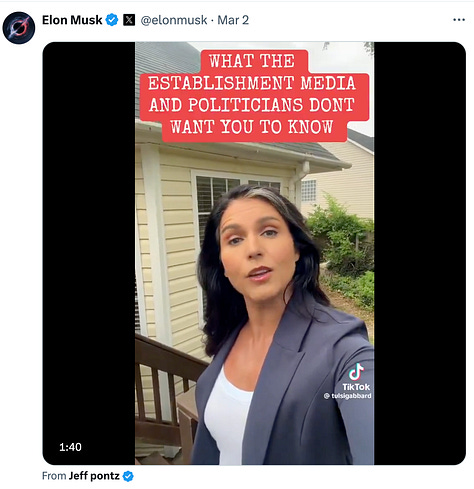
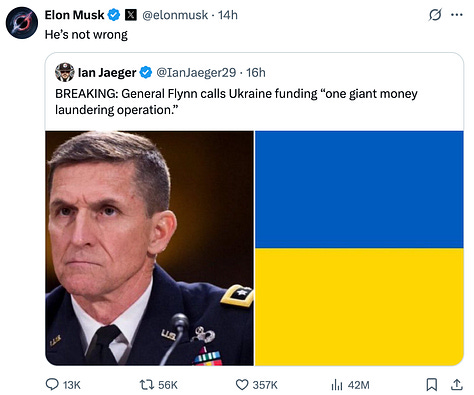


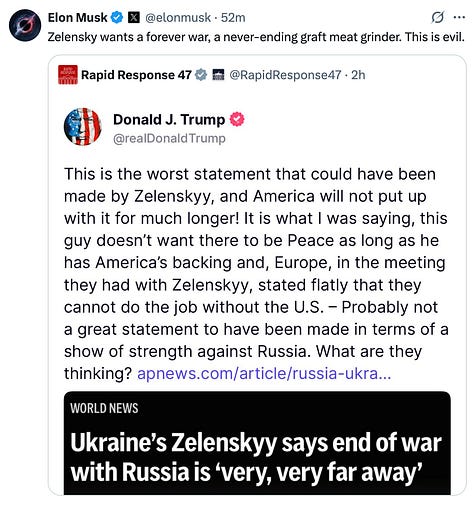
Together, Trump, Vance, and Musk have reshaped the West’s posture toward Ukraine, Europe, and the transatlantic alliance — not in the direction of strength, but of retreat. Their actions don’t just undermine Ukraine. They unravel the cohesion, credibility, and moral clarity of the Western alliance itself.
This isn’t strength — it’s sabotage.
You don’t defend the West by gutting its alliances and embracing its adversaries. You don’t protect civilization by hollowing out the trust and cooperation that have held it together for generations. The transatlantic alliance, built painstakingly after World War II, was never just about military logistics. It was a civilizational project anchored in shared values like democracy, rule of law, and territorial sovereignty. Trashing these institutions and relationships doesn’t restore the West. It unravels it.
This is not an argument against constructive criticism, reform, or rethinking our geopolitical strategy when it comes to the West. Trump supporters will argue that pushing for a ceasefire, pressuring NATO allies to pay their fair share, and calling out Western Europe’s bureaucracy can be constructive. I agree. However, there’s a difference between advocating constructive reform among friends and alienating those friends. There’s a difference between encouraging Ukraine to go to the negotiating table and accusing Zelensky of being a dictator, cutting off intelligence, and not even being able to admit that Russia’s the aggressor.
Trump, like an Antichrist, mimics the spirit of Western civilization while pulling out its foundation stones, brick by brick. He wraps himself in the language of strength and tradition but leaves chaos and cynicism in his wake. Like a serpent dressed in robes of virtue, he slithers beneath banners of greatness infecting others with the MAGA mind virus. He presents himself as a bulwark against Western decay, as an alpha male with the backbone to deter enemies, yet has a pattern of appeasing Putin and other autocratic flatterers.
I once believed Trump might be a disruptive force who could jolt stale institutions back into relevance. But disruption without strategic vision and moral clarity isn’t renewal — it’s just chaos. Just as the Antichrist denies God and threatens the end of the world, Trump’s inability to look beyond his ego is putting the global order and future of humanity at stake. His transactionalism, absent a broader vision, is not leadership but a sort of sorcery. It is an approach to foreign policy without God or a sense of the good. Some might characterize it as “retail sanity and wholesale madness.”
Trump has taken the vocabulary of the West — strength, sovereignty, identity, civilization — and reduced it to a hollow chant. A simulacra. To my ears, he sounds more and more like a false prophet. A deceiver. One who speaks strong words in front of the Warsaw Uprising Monument but doesn’t abide by his words when push comes to shove, as with Ukraine.
If we truly care about defending the West, then we must defend the sovereignty and territorial integrity of its nations, deter those that threaten it, and treat our alliances, institutions, and relationships with care, even as we seek to renew them. That means standing with our allies, not against them. That means strengthening and improving NATO, not dismantling it. That means choosing statesmanship over spectacle, and grounding ourselves in hard facts rather than propaganda lies.
Despite his mythological rhetoric, Trump isn’t offering strength. He’s offering abandonment and chaos. If renewal comes, it probably will be in reaction to him, not because of him.
The hour is late, and false prophets and deceivers lurk among us. Not all will have horns; indeed, some may wear Brioni. We should ask whether Trump is one of them — a beast cloaked in civilizational rhetoric, an Antichrist wearing a red tie.
Special thanks to for draft feedback.
Related writings:
My speech at the Deploraball (2017)
Why the American Right should break from Trump and Trumpism (2022)


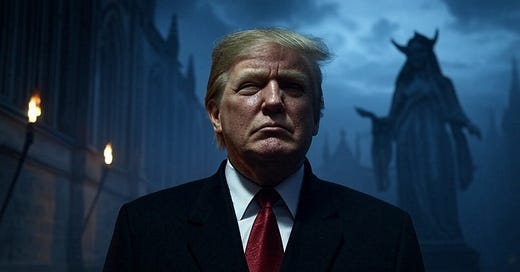



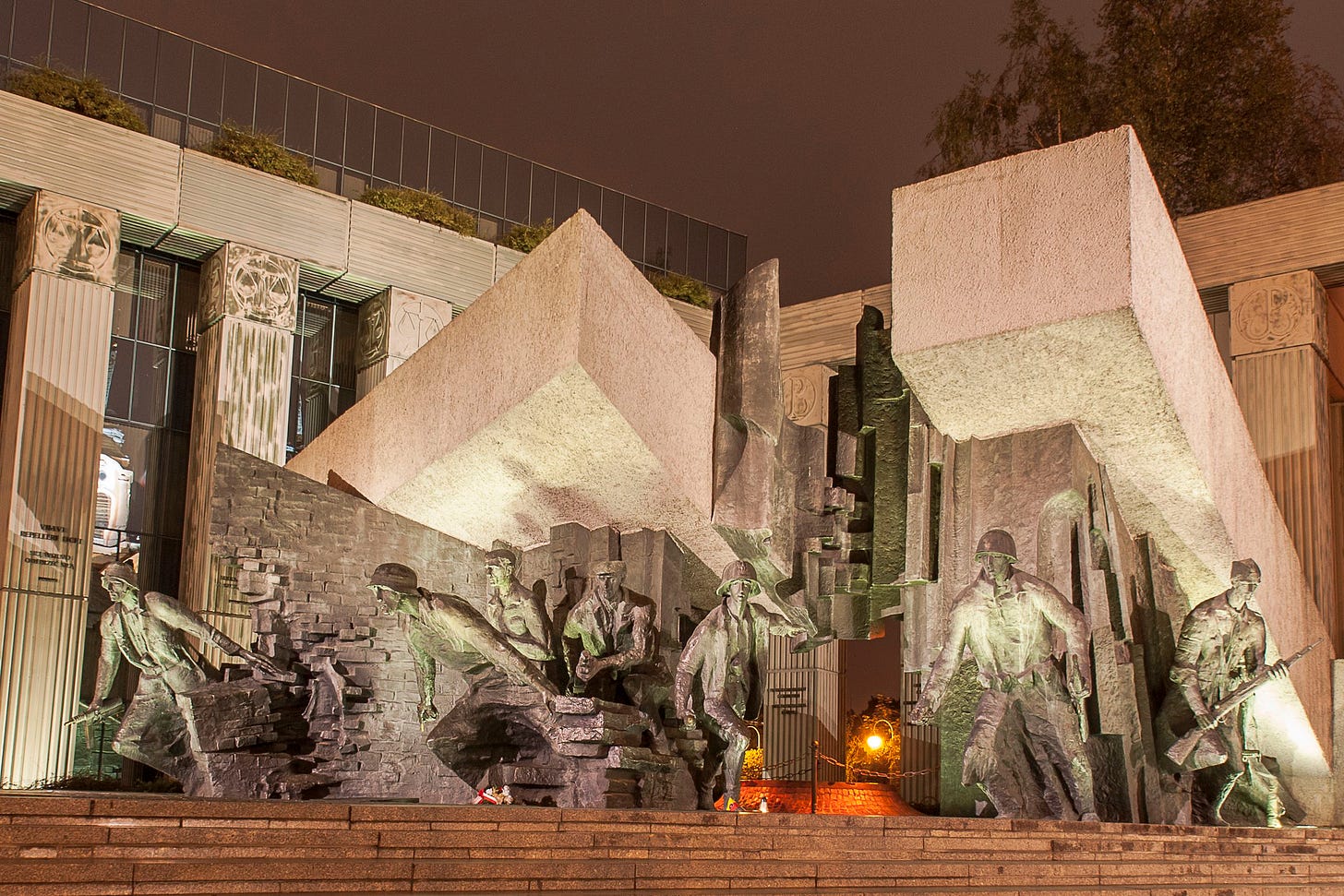
Defending the west while letting an eastern power (Russia) run amok. Yeah, that makes sense.
At some point in the future, historians are gonna look at us and say, “why didn’t the masses accept the Occam’s razor explanation - that Trump was always a Russian asset?”
I have toggled back and forth with these questions. My conclusions tend to be more sinister and subversive than yours. Hope I'm wrong.